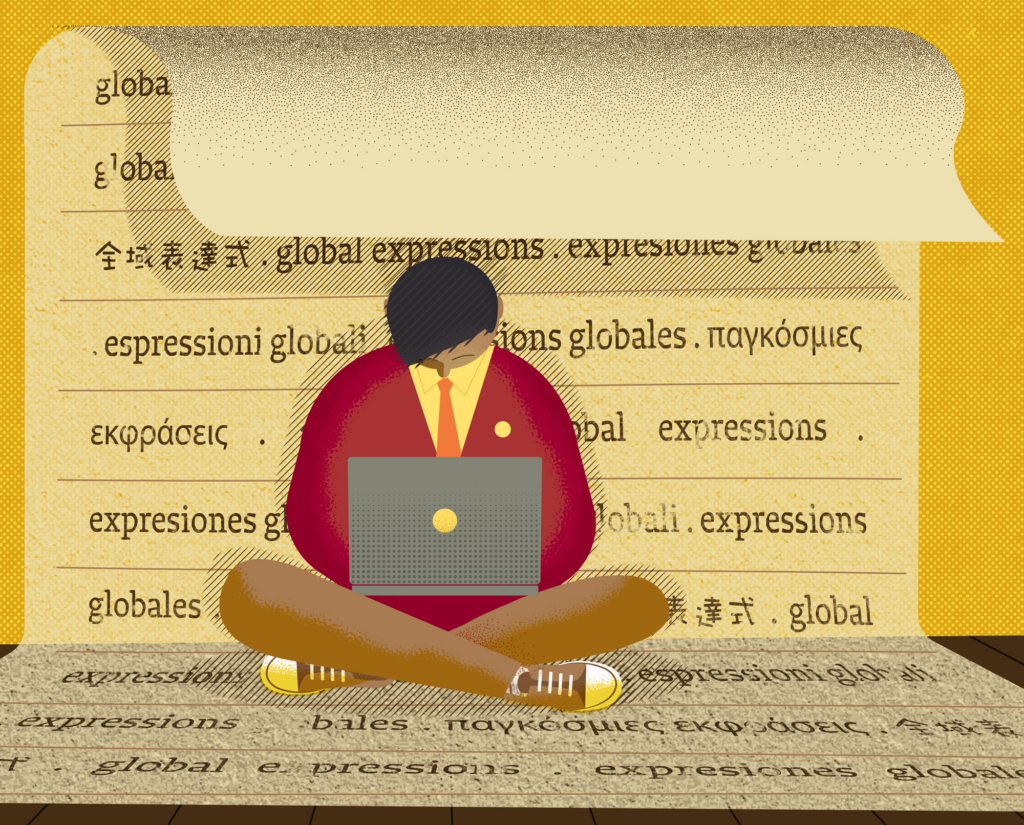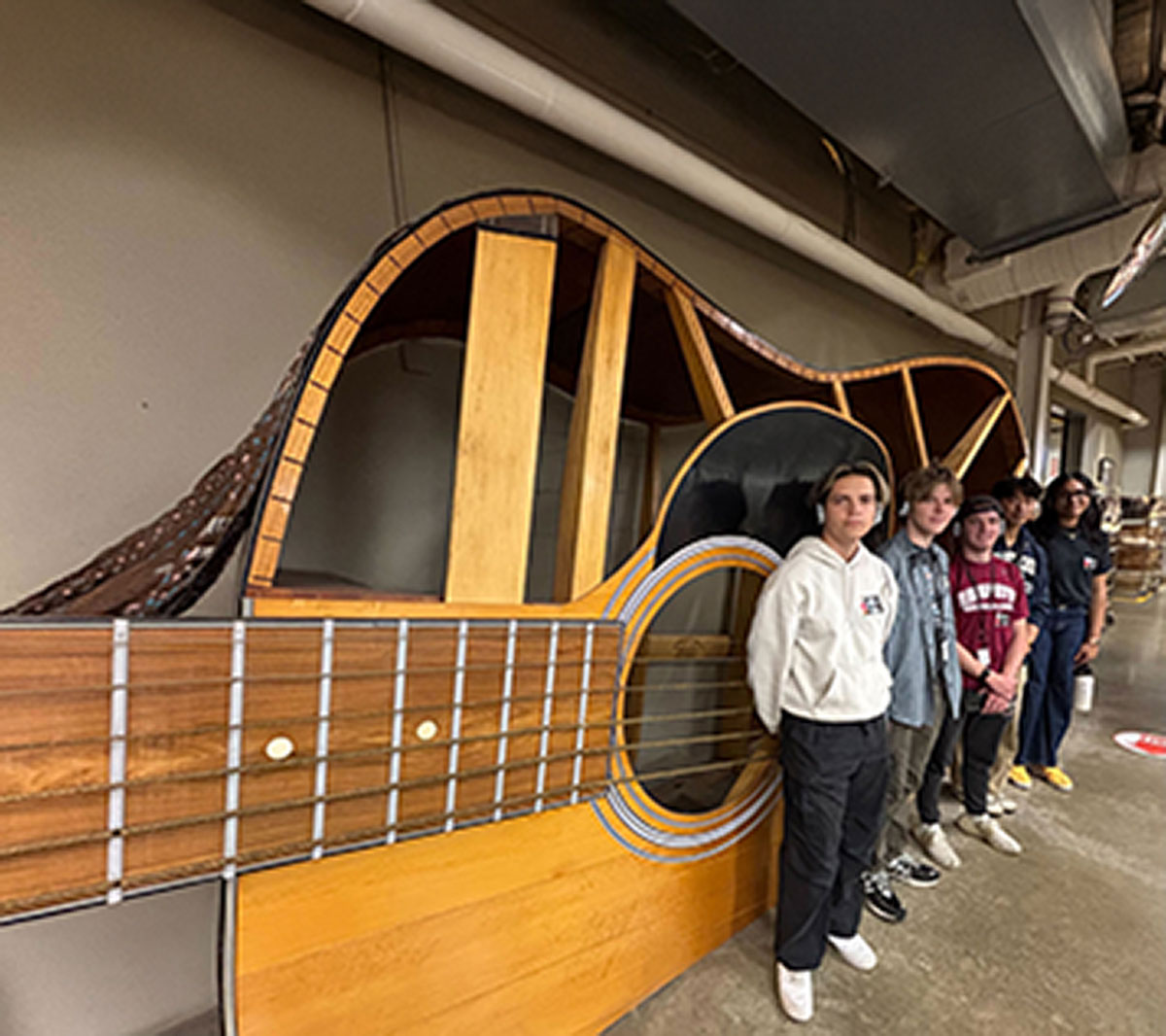Meaning and translation
How the Global Expressions project is amplifying the voices of multilingual students.
BY Katlyn Clarke

ILLUSTRATIONS BY FRANCESCO ZORZI
Director of the College’s English for Academic Purposes Center Tingting Kang recognizes the distinct value of an institution’s multicultural and international communities. In the fall, Lafayette had undergraduate students from 47 different countries enrolled. “It is truly a privilege to have such a diverse group of people on campus,” Kang says.
With support from Tim H. Cox, dean of advising and co-curricular programs, Kang established Global Expressions: Writing Beyond the Mother Tongue in 2022 to celebrate these voices. The project is an online platform (found at sites.lafayette.edu/ge) that serves to celebrate multiculturalism and multilingualism by inviting students to write about their personal experiences studying in the United States, or abroad in another country.
Kang and her partners instituted the concept as an annual writing contest to draw the interest of both students and faculty. Kang also received support from the College administration and President Nicole Hurd, who participates on the judges’ panel.
Students provide each version of their writing: one submitted in English and another translated into the student’s second, third, or fourth language. Both versions are published side by side. While the goal is to create an increased sense of belonging for people who speak the same languages, it also gives readers the chance to experience new languages for the first time. So far, 12 different languages are highlighted on the website, including French, Chinese, and Swahili; nearly 50 unique stories have been published, some by repeat contributors. Kang describes the project as a true “multicultural exchange,” noting that some students who submit to Global Expressions are not international students.
Jiayu “Angel” Yan ’28, intended theater and economics major, remembers when she received her offer letter from Lafayette. She swiftly began researching international student resources—and saw Global Expressions online.
When Yan arrived from China, she attended workshops hosted by the English for Academic Purposes Center, where she met Kang. “We realized many American students don’t know what international students and faculty have been through,” Yan says. “I think this project is a great way to show them what our lives were like, and how they are now.”
Prompts for this year’s Global Expressions contest include discussing one perception of the U.S. or any study-abroad country— and how that perception changed once immersed in the culture. Another writing prompt is to describe a memorable cultural exchange experience with someone from a different country.
Areeb Atheeque ’25, math-economics major, won the 2024 writing contest for his piece, “From the Indian Ocean to the Atlantic–A Journey of Education and Self-Discovery.” (He submitted his writing in English and Sinhala.) In his essay, Atheeque recalls the intricacies of his arrival to Lafayette. “Despite having never experienced feelings of self-consciousness before, my ‘accent’ made me feel uneasy at times,” Atheeque wrote. “I found myself having to think and carefully enunciate every word.”
He first learned about Global Expressions after enrolling in Kang’s academic writing course. “I read through some past submissions and was thinking, ‘I could do this too,’” Atheeque says. “I’m not really fluent in writing my native language, although I can speak fluently. It was good practice.” Now, Yan and Atheeque work closely with Kang as they embark on the next iteration of Global Expressions, a podcast. The concept is to continue the conversation, and to have international and multilingual students interview international faculty.
“I hope that international students, faculty, and staff can exchange their experiences in terms of cultural adjustment, studying abroad, and leaving the U.S.,” Kang says. “By showcasing our international faculty and staff success, it also helps students learn more from those who can be role models.”
Ten faculty members have already signed up, along with more than a dozen student interviewers. The first episode is planned to air in April; Yan is working behind the scenes with Kang on getting a website together and setting up the interviews in Skillman Library’s podcast studio. “Exposing students to different faculty members is important,” Atheeque says, “so maybe they’ll think, ‘I should connect with that professor.’”
Students are looking forward to asking faculty members about their experiences coming to the U.S., and how they found a sense of home. “I see myself being a part of the project through my senior year,” Yan says. “We’re just getting started.”
As the energy builds, Kang is happy to see Global Expressions interconnect the Lafayette community. “When people come here from other parts of the world, sometimes they prefer to mingle with their specific ethnicity or nationality,” Atheeque adds. “I think they miss out by doing that.” The online platform and forthcoming podcast are both opportunities to embrace different cultures from across the globe, with feet firmly planted at Lafayette.



